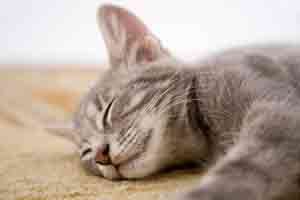Why do cats purr? Here's why...

Why do cats purr?
Cats always keep you guessing. Are they happy to see you? Angry with the world? Or completely indifferent to everything around them? They rub against your legs when you’ve forgotten they’re in the room and purr in your ear in the middle of the night… But what exactly does that purr mean?
Petplan explains what your cat might be trying to say with a purr, precisely how cats purr, and how purring can help with their growth and development in several ways…
How do cats purr?
You might wonder how that lulling sound is created…
A cat’s purr begins in the brain, which sends neural messages to the larynx. This causes the airway structures and laryngeal muscles to oscillate. The vocal chords then separate as your cat inhales and exhales, causing the purring sound.
However, not all cats purr! While all domestic cats and some wild cats purr, bigger cats such as lions, tigers and jaguars do not. The general rule of thumb is that cats that can roar can’t purr, and cats that can purr can’t roar.
Different types of cat purring
Like so many things about cats, their purr has its own mystique and meaning. There’s no question that when your purring furball is curled up on your lap, those rhythmic rumbles are saying they are perfectly content, thank you very much.
But cats may also purr when life isn’t so hunky-dory: For example, when they’re in pain or frightened. The most common reasons your cat might be purring include:
- Happiness – your cat is simply content! If they’re curled up, relaxed and looking sleepy, you can guess that they’re purring because they are happy.
- Hunger – when food is on their mind, you’ll hear your cat’s purrs intertwined with regular meows.
- Relief – as mentioned before, when your cat is hurt or afraid, purring can offer them a sense of relief and a way for cats to comfort themselves. Dr Stanley Coren says: ‘It may be that purring is usually such a positive signal that cats gain reassurance from hearing their own purring sounds.’
- Developing a bond with their kittens – all cats are born with the ability to purr, whether domestic or wild. Kittens purr before they can even open their eyes to reassure their mother that they are alive and well – and mum purrs back to let them know she’s ready to nurse them. The vibrations from the mother’s purrs allow the young kittens to find her more easily.
- Healing - Scientists argue that purring is a natural healing tool. The low frequency of purrs can improve bone strength and mobility, as well as repairing tendons and ligaments, reducing pain and swelling. Since the purr has lasted through hundreds of cat generations, it follows that there must be a survival mechanism behind it!
Growth and development
Regular exercise is the best way to keep bones and muscles strong, but most cats spend a lot of time lounging around. This is where purring helps promote a healthy lifestyle!
Purring while resting stimulates bone growth, increases muscle and ligament strength, and helps to maintain good health. So, while your feline friend might seem to be napping, the healing qualities of purring are hard at work!
Veterinary professionals have also observed that bone and muscle diseases are rare in cats and as a cat owner, it won’t be news to you that cats are remarkably resilient and recover quickly, especially from high falls.
So, next time you hear your furry companion purring, remember that there is a multitude of things they could be trying to communicate. Hopefully the purr is one that is soothing your cat, as well as you.
Do you have any stories about your cat's purr? Let us know in the comments below…

